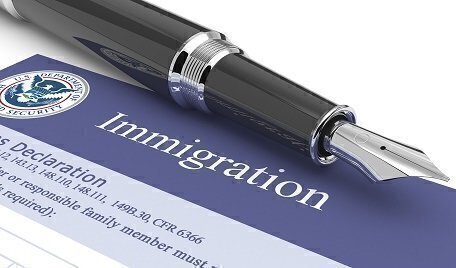The Trump Administration, insisting that the presidential order limiting entry to the U.S. of foreign nationals from Mideast nations “is not a so-called ‘Muslim ban,’ ” urged the Supreme Court on Thursday evening to throw out without a decision two major cases pursued by challengers to the restrictions.
 The 84-page brief was the first document to be filed with the Justices on the major issue the Justices agreed in late June to review at their next term — the legality of President Trump’s March 6 executive order suspending entry by foreign nationals and refugees. The Justices have scheduled a hearing on that issue on October 10. The challengers will file their own brief on the legality issue next month.
The 84-page brief was the first document to be filed with the Justices on the major issue the Justices agreed in late June to review at their next term — the legality of President Trump’s March 6 executive order suspending entry by foreign nationals and refugees. The Justices have scheduled a hearing on that issue on October 10. The challengers will file their own brief on the legality issue next month.
That review is separate from a continuing controversy about how, in the meantime, the Trump Administration can enforce the provisions of the executive order. The Supreme Court has twice issued temporary orders allowing enforcement of some of the order. That part of the controversy is now awaiting a decision in a federal appeals court in Seattle, and seems likely to return to the Justices in advance of the opening of their new term.
The government’s new brief contended that no one among the challengers can show that they are now being harmed or will suffer any harm from the March order by Trump, so lower court decisions against the order should be set aside as lacking any legal basis. Two federal appeals courts have ruled that the executive order either was an unconstitutional form of religious discrimination against Muslims, or went beyond presidential authority under federal immigration laws governing the power to exclude foreign nationals from this country.
In trying to counter the claim that the real purpose of the Trump action was to keep Muslims out of the U.S. because of their faith, the brief argued that it is a serious affront to the presidency to second-guess the motives of a Chief Executive by accusing him of bias against “one of the world’s major religions.”
The federal appeals court’s ruling against the executive order as a “Muslim ban,” the new filing asserted, runs directly counter to President Trump’s speech in Saudi Arabia in May calling for “tolerance and respect” for all faiths, and imputes a biased motive to a presidential order that is “neutral on its face” as to religion and is aimed only at protecting national security.
The appeals court’s decision “plainly carries the potential to undermine the Executive’s ability to conduct foreign relations for and protect the security of the Nation,” the government lawyers wrote.
The brief also urged the Supreme Court not to allow lower courts, in weighing President Trump’s immigration action, to rely upon statements he made while a candidate for the presidency. Those statements, including calling for a “complete Muslim ban,” did not represent the views that President Trump held after he took the oath of office and assumed major constitutional responsibilities, the brief argued.
Restricting government authority based on political campaign rhetoric not only treats such speechmaking as the equivalent of actual policy, but also will present a threat to free speech for those making campaign orations, according to the brief.
The two main provisions of the Trump order that the Justices will be weighing as valid or invalid are a 90-day suspension of entry from all foreign nationals from six Mideast nations that have Muslim majority populations, and a 120-day suspension of entry from refugees from anywhere in the world.
These entry restrictions were suspended by the presidential order in order to give government officials time to improve the procedures for “vetting” foreigners seeking to travel to the U.S. As currently written, the 90-day suspension from the Mideast nations will expire in late September, before the Supreme Court even holds its hearing on October 10, and the 120-day suspension of refugees’ arrival will expire on October 24, just two weeks after that hearing.
Those time factors suggest that the cases could lose their legal significance – in legal terms, become “moot” – before the Justices have the opportunity to rule on President Trump’s order.
The new brief did not discuss the effect of those expirations on the cases. However, in discussing another timing factor that could affect whether the 90-day suspension has already become “moot,” the new document said that any finding that the controversy has become moot should lead the Justices to simply erase the lower court rulings against the President.
On the validity of the Trump order, the brief made a full defense, both on the question of the president’s power to issue the law under federal immigration laws, and on the question of whether it is an unconstitutional ban on entry based on religious bias.
The brief said clear-cut Supreme Court precedents demonstrate that the courts are ill-equipped to second-guess the Chief Executive in the use of power granted by Congress to decide which classes of foreign nationals can be barred from entering the country. The appeals courts were wrong in finding exceptions that allow them to do just that kind of second-guessing, the filing argued.
Legendary journalist Lyle Denniston has written for us as a contributor since June 2011 and has covered the Supreme Court since 1958. His work also appears on lyldenlawnews.com, where this story first appeared.






